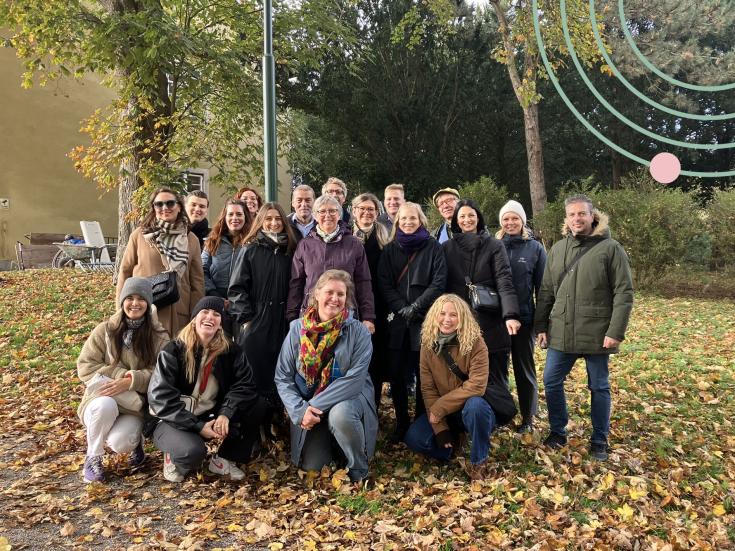Study Tour in Malmö
We had a fun-packed yet very educational in-person study tour in Malmö, Sweden, bringing together the partners of the Good Cities Project for three enriching days of learning, collaboration, and inspiration. Hosted by Malmö Municipality and co-organized with Bax, the event gathered representatives from Tartu 🇪🇪, Jyväskylä 🇫🇮, Újbuda (Budapest) 🇭🇺, Clube, and the Region of Western Macedonia 🇬🇷. Together, we explored cutting-edge approaches to the sharing economy, sustainability, and community-building that are helping shape resilient, connected urban ecosystems across Europe.
🏡 Day 1: Sege Park and Collaborative Ecosystem Workshop
Our journey began with a visit to Sege Park, a district showcasing innovative models for climate-smart and community-centered living. Highlights included Sweden’s largest wooden car park, equipped with solar-powered shared electric car stations, and a co-housing complex, where residents share meals, make collective decisions, and foster strong social bonds.
Sege Park is also home to the work of Drevet, a social enterprise that champions circular business models and sustainable crafts training. Drevet runs initiatives such as the hub for sharing and reusing resources,, engaging residents as active contributors to neighbourhood development, or restoring 100-year-old windows using energy-efficient, traditional methods.
Dr. Yuliya Voytenko Palgan, from Lund University, delivered a lecture on the governance of the sharing economy, focusing on the role of municipalities and why their approaches differ. She highlighted key contextual factors—including structural, economic, political, sustainability, and cultural dimensions—that shape municipal governance. Her talk emphasized the importance of understanding these factors, addressing knowledge gaps, and leveraging cross-city comparisons to develop effective, tailored governance strategies for the sharing economy.
The Ecosystem Building Workshop by Eutropian focused on fostering collaborative networks among local actors, rooted in circular economy principles, by sharing resources like spaces, materials, and services to reduce costs, enhance synergies, and build sustainable neighborhoods. Cities also conducted a SWOT analysis and presented their unique situations, highlighting their specific strengths, challenges, and opportunities.
The visit concluded with a heartfelt dinner prepared by Sege Park’ co-housing residents, offering us a firsthand experience of the warmth and connection that co-housing fosters.
📚 Day 2: Embassy of Sharing, Library Visit, and Community-Building Workshop
On Day 2, we explored the Embassy of Sharing in Hyllie, a neighbourhood focused on circularity and social sustainability. We toured Malmö’s newly opened city district library, which actively engages youth through co-creation workshops and inclusive events that empower young people to shape their community.
The Community Building Activities Workshop explored how cities could implement the proejct aims and models by 2030, focusing on either a decentralized approach (scattered community spots) or a centralized hub, while outlining goals, identifying resources, and evaluating key assumptions for tailored strategies.
🏐 A Fun Finale with Piffl!
The study tour concluded with a visit to a Piffl box in a local park. Piffl is a sharing platform that encourages spontaneous outdoor sports, games and activiites by making equipment like volleyballs or picknick equipment easily accessible via an app. This playful, inclusive approach highlighted Malmö’s vision for community-centered urban spaces that bring people together through shared activities.
The Malmö study tour was an invaluable opportunity to exchange knowledge, strategies, and ideas for building collaborative, sustainable cities, and to learn from Malmö’s leadership in circular economy, community-building, and innovative urban solutions. The tour left us inspired and equipped with practical insights for our own urban ecosystems.

